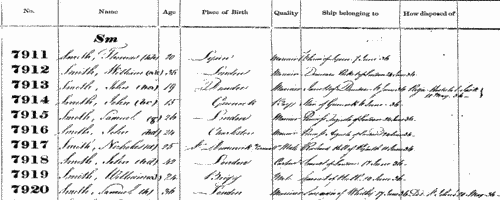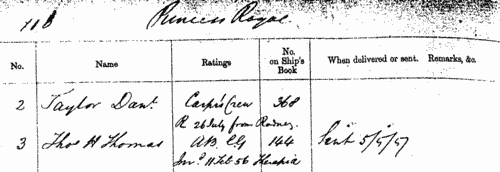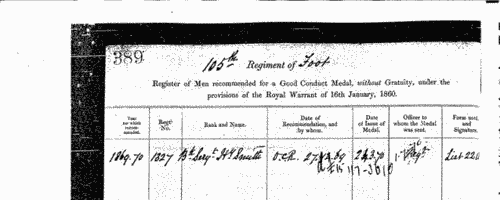Mccawley Surname Ancestry ResultsOur indexes 1000-1999 include entries for the spelling 'mccawley'. In the period you have requested, we have the following 24 records (displaying 1 to 10): Single Surname Subscription | | | Buying all 24 results of this search individually would cost £154.00. But you can have free access to all 24 records for a year, to view, to save and print, for £100. Save £54.00. More... |
These sample scans are from the original record. You will get scans of the full pages or articles where the surname you searched for has been found. Your web browser may prevent the sample windows from opening; in this case please change your browser settings to allow pop-up windows from this site.  Sailors on board H. M. S. Goliath
(1795-1798) Sailors on board H. M. S. Goliath
(1795-1798)
His Majesty's ship the Goliath took part in the destruction of the French fleet in Aboukir Bay at the mouth of the Nile ('the Battle of the Nile') on the evening of the 1st and morning of the 2nd August 1798. This is the muster book for 1 April to 30 September 1798: being a continuation book in a series covering wages and victualling from December 1795, it also includes the names of some men who had died, deserted or been discharged from the ship from then to April 1798. Of the ship's complement of 590, this index covers the sailors, volunteers, and boys, as well as the supernumeraries: but not the marines, or the French prisoners taken after the battle.MCCAWLEY. Cost: £8.00.  | Sample scan, click to enlarge

|  Marines on board H. M. S. Vanguard
(1797-1798) Marines on board H. M. S. Vanguard
(1797-1798)
His Majesty's ship the Vanguard (Admiral Horatio Nelson's flagship) took part in the destruction of the French fleet in Aboukir Bay at the mouth of the Nile ('the Battle of the Nile') on the evening of the 1st and morning of the 2nd August 1798. This is the muster book for 1 July to 31 August 1798: being a continuation book in a series covering wages and victualling from December 1797, it also includes the names of some men who had died, deserted or been discharged from the ship from then to July 1798. MCCAWLEY. Cost: £8.00.  | Sample scan, click to enlarge

|  British merchant seamen
(1835-1836) British merchant seamen
(1835-1836)
At this period, the foreign trade of ships plying to and from the British isles involved about 150,000 men on 15,000 ships; and the coasting trade about a quarter as many more. A large proportion of the seamen on these ships were British subjects, and so liable to be pressed for service in the Royal Navy; but there was no general register by which to identify them, so in 1835 parliament passed a Merchant Seamen's Registration Bill. Under this act this large register of British seamen was compiled, based on ships' crew lists gathered in British and Irish ports, and passed up to the registry in London. Each seaman was assigned a number, and the names were arranged in the register by first two letters of the surname (our sample scan shows one of the pages for 'Sm'); in addition, an attempt was made to separate out namesakes by giving the first instance of a name (a), the second (b), and so on. But no effective method was devised to prevent the same man being registered twice as he appeared in a second crew list; moreover, the original crew lists were clearly difficult for the registry clerks to copy, and some of the surname spellings appear to be corrupted. A parliamentary committee decided that the system devised did not answer the original problem, and this register was abandoned after less than two years: but it is an apparently comprehensive source for British merchant seamen in 1835 to 1836. The register records the number assigned to each man; his name; age; birthplace; quality (master, captain, mate, 2nd mate, mariner, seaman, fisherman, cook, carpenter, boy &c.); and the name and home port of his ship, with the date of the crew list (usually at the end of a voyage). Most of the men recorded were born in the British Isles, but not all (for instance, Charleston and Stockholm appear in the sample scan). The final column 'How disposed of' is rarely used, and indicates those instances where a man died, was discharged, or deserted his ship during the voyage.MCCAWLEY. Cost: £8.00.  | Sample scan, click to enlarge

|  Outstanding British artillerymen
(1846-1848) Outstanding British artillerymen
(1846-1848)
Non-commissioned officers and men of the Royal Artillery discharged and recommended for medals and gratuities. The lists state rank, name, battalion or corps, date of recommendation, date awarded, and total length of service (in years and days), with length of foreign service (in years and days) and as serjeant and staff serjeant (in years and days). The lists themselves are basically of recommendations, then annotated to show award of medal and/or gratuity, which in most cases naturally followed. Where an award was not made, the reason is usually given. Where a man's name is crossed through it should not be assumed that he was deleted from the list: sometimes the name is crossed through when the medal has been dispatched. (The sample scan is from 1847)MCCAWLEY. Cost: £8.00.  | Sample scan, click to enlarge

|  Sailors and marines on H. M. S. Leander in the Crimean War
(1854-1856) Sailors and marines on H. M. S. Leander in the Crimean War
(1854-1856)
Sebastopol in the Crimea was the great Russian naval arsenal on the Black Sea. A combined assault by British, French and Turkish troops resulted in the reduction of Sebastopol and led to the Treaty of Paris of 27 April 1856, guaranteeing the independence of the Ottoman Empire. By Admiralty Order the Crimea Medal was awarded to sailors and marines present during the campaign, between 17 September 1854 (the first landing at Eupatoria) and 9 September 1855 (when the allies secured Sebastopol). The sailors' medals were mostly delivered to them on board ship in the course of 1856; the marines' medals were sent to their respective headquarters for distribution. The remarks as to distribution in this medal roll therefore give more specific information as to the whereabouts of the sailor recipients in 1856 than about the marines. Her Majesty's Ship Leander, a 50-gun sailing ship, took part in the assault. Four clasps to this medal were awarded to the men present in the actions at Sebastopol itself, Inkerman, Balaklave (Balaclava) and (the sea of) Azoff, but the recipients of these clasps are recorded on separate rolls, not part of this index, but indexed on this site. This index also covers the Sulina, a tender to the Leander.MCCAWLEY. Cost: £8.00.  | Sample scan, click to enlarge

|  Sailors of H. M. S. Princess Royal who fought in the Azoff Sea
(1854-1856) Sailors of H. M. S. Princess Royal who fought in the Azoff Sea
(1854-1856)
Sebastopol in the Crimea was the great Russian naval arsenal on the Black Sea. A combined assault by British, French and Turkish troops resulted in the reduction of Sebastopol and led to the Treaty of Paris of 27 April 1856, guaranteeing the independence of the Ottoman Empire. By Admiralty Order the Crimea Medal was awarded to sailors and marines present during the campaign, between 17 September 1854 (the first landing at Eupatoria) and 9 September 1855 (when the allies secured Sebastopol). Her Majesty's Ship Princess Royal, a 90-gun screw steamer, took part in the assault. Four clasps to this medal were awarded to the men present in the actions at Sebastopol itself, Inkerman, Balaklave (Balaclava) and (the sea of) Azoff. The Sea of Azoff (Azov, Azoph, Azof), east of the Crimean peninsula, is an arm of the Black Sea, with which it is united by the Straits of Kertch or Kaffa. This is the Azoff Clasp Roll, recording the names of the men from the ship who took part in the actions on the Azoff Sea during the Crimean War.MCCAWLEY. Cost: £8.00.  | Sample scan, click to enlarge

|  Sailors and marines awarded the Baltic Medal
(1854-1857) Sailors and marines awarded the Baltic Medal
(1854-1857)
During the Crimean War, a British and French fleet entered the Baltic, and captured Bomarsund harbour and one of the Aland Islands (now part of Finland). Bomarsund is the sound between the islands and the Swedish island of Vardo; and at the fine harbour on Bomarsund, dominating the entrance of the Gulf of Bothnia, and indirectly that of the Gulf of Finland, the Russians had constructed a northern naval base, and this was destroyed in the attack. The British fleet taking part in the Baltic expedition comprised Her Majesty's ships Aeolus, Ajax, Alban, Algiers, Amphion, Archer, Arrogant, Basilisk, Belleisle, Blenheim, Boscawen, Bulldog, Caesar, Calcutta, Centaur, Colossus, Conflict, Cornwallis, Cossack, Cressy, Cruizer, Cuckoo, Cumberland, Dauntless, Desperate, Dragon, Driver, Duke of Wellington, Edinburgh, Esk, Euryalus, Exmouth, Falcon, Firefly, Geyser, Gladiator, Gorgon, Hannibal, Harrier, Hastings, Hawke, Hecla, Hogue, Imperieuse, James Watt, Leopard, Lightning, Locust, Magicienne, Majestic, Merlin, Miranda, Monarch, Neptune, Nile, Odin, Orion, Otter, Pembroke, Penelope, Pigmy, Porcupine, Prince Regent, Princess Royal, Pylades, Resistance, Retribution, Rhadamanthus, Rosamond, Royal George, Royal William, Russell, St George, St Jean D'Acre, St Vincent, Sphinx, Stromboli, Tartar, Termagant, Tribune, Tyne, Valorous, Volage, Volcano, Vulture, Wrangler and Zephyr. This is the medal roll of the naval and marine claimants who qualified for the Baltic Medal for service in 1854 to 1855. The medals were dispatched in batches from early 1857, the first batch being numbered B A 1, the next B A 2, &c.; then follows the destination (a place or, more usually, a ship) and the date of dispatch. Most of the medals had been sent by the end of 1857.MCCAWLEY. Cost: £8.00.  | Sample scan, click to enlarge

|  Outstanding soldiers of the 25th regiment of Foot
(1860-1870) Outstanding soldiers of the 25th regiment of Foot
(1860-1870)
The 25th (The King's own Borderers) Regiment of Foot embarked for Gibraltar in 1858, and was there in 1860: the depot was at Athlone. A second battalion was raised in England in 1859, and sent to Ceylon in 1863, and on to India in 1868. Each year just a handful of outstanding soldiers of the regiment were chosen for good conduct medals and gratuities: these are listed here. There were two lists, one for men recommended for the Good Conduct Medal without a gratuity, and one for gratuities - £5 to a private, £10 to a corporal, and £15 to a serjeant. Both lists are indexed here, and each gives rank, name, regimental number, date of recommendation and date of issue. (The sample scan is from the 105th foot)MCCAWLEY. Cost: £8.00.  | Sample scan, click to enlarge

| Soldiers' Balances Unclaimed
(1872)
The War Office, under 'The Regimental Debts Act, 1863' compiled and published lists of names of deceased soldiers whose personal estate was held by the Secretary of State for War for distribution amongst the Next of Kin or others entitled. These lists give full name (surname first), rank, regiment, and the amount of the estate unclaimed. During 1872 new lists XLIV to XLVI relating to recent deaths were issued, as well as republications of lists XXXIV to XXXVI, XXIV to XXVI, XIV to XVI and IV to VI from previous years showing details of balances still remaining unclaimed. MCCAWLEY. Cost: £6.00.  | Sample scan, click to enlarge

| Debtors
(1880)
County Court Judgments in England and WalesMCCAWLEY. Cost: £6.00.  | Sample scan, click to enlarge

|
Research your ancestry, family history, genealogy and one-name study by direct access to original records and archives indexed by surname.
|













